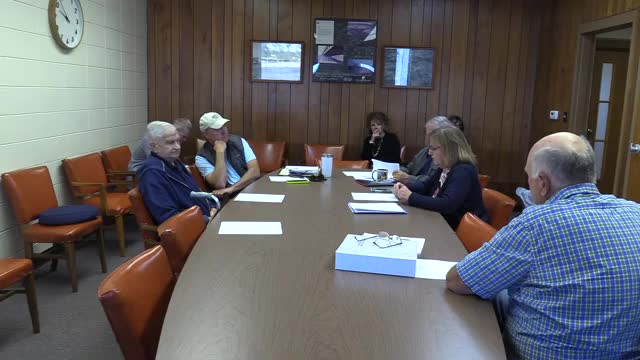Edgar County commissioners set hearings on solar-and-battery ordinance after lengthy tax, decommissioning debate
Get AI-powered insights, summaries, and transcripts
Subscribe
Summary
Edgar County Board of Commissioners members scheduled a study session for the second Monday in November and a vote at the board's second November meeting on a proposed ordinance that would govern wind, solar and battery energy storage systems in the county.
Edgar County Board of Commissioners members scheduled a study session for the second Monday in November and a vote at the board's second November meeting on a proposed ordinance that would govern wind, solar and battery-energy-storage systems in the county.
The board's discussion focused on three recurring issues: how state requirements limit local authority, how solar-plus-storage projects will be valued and taxed, and whether decommissioning and other contract terms are negotiable. Board members said county staff and outside counsel will be asked to clarify each point at the upcoming hearing.
County staff reported the application under discussion includes a proposal of roughly 200 megawatts and that a slide in the developer's presentation showed approximately $23 million in projected local revenue over the life of the project; staff said one's arithmetic on paper produced an initial annual estimate on the order of $1,000,000, and the developer's materials illustrated a model that would yield roughly $500,000 per year to distribute across taxing districts if the project generated the full projected payments over a 20-year span. Commissioners repeatedly cautioned those figures are estimates and said they expected more precise tax valuations at the public hearing.
Members discussed battery storage explicitly and directed that the ordinance language include energy storage systems so an applicant proposing batteries-only would be covered. Board members also asked whether battery capacity or acreage for storage alters the statutory tax formula the county will use; staff said the state sets the assessment formula and that Dina (county staff referenced in the meeting) had indicated a state formula governs valuation, but commissioners said they want a fuller written and verbal explanation at the hearing.
On decommissioning, the board discussed contractual percentages referenced in the applicant's model (characterized in the meeting as 10%, 50% and 100% benchmarks). Commissioners asked whether those percentages are fixed by the model agreement or subject to local negotiation. County counsel and outside counsel were asked to confirm whether those decommissioning terms are statutorily mandated, model provisions that the county cannot change, or negotiable terms within a building contract.
Several commissioners and members of the public raised questions about where the electricity would flow and who ultimately benefits from the project. Staff noted interconnection plans showed a tie into transmission lines crossing the Indiana state line and that large utility owners (the presentation referenced Duke in the region) would be part of distribution. Commissioners said they would press the developer to describe the transmission path and any implications for local economic benefit at the public hearing.
Board members also discussed process: how an application that meets state requirements affects the county's ability to impose additional local conditions, whether projects approved under a prior ordinance are grandfathered and the need to preserve the exact ordinance text in county records at the time of approval. Members asked that the county attorney explain, on the record at the hearing, what the county can and cannot require under state law so residents are clear about the local role.
The board set a public hearing and directed staff to publish required legal notices; no formal vote on the ordinance occurred at this meeting. Commissioners said negotiations on decommissioning and other contract elements would continue through the building contract and that staff should prepare clear written guidance and testimony for the hearing.
Context and next steps: the board's schedule calls for a study session in early November and a hearing that will include developer presentations, public comment and legal clarifications from county counsel. Commissioners asked staff to obtain explicit written clarification from counsel about valuation and decommissioning and to present the information publicly at the hearing so residents and taxing bodies can evaluate economic and fiscal impacts.
